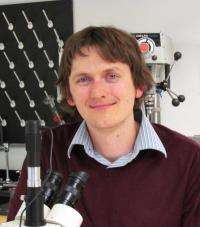Boston College physics professor Stephen Wilson receives NSF Career Award

Assistant Professor of Physics Stephen Wilson has received a career award from the National Science Foundation to support his research into the behavior of electrons in three new classes of materials.
Wilson's research will focus on a neutron scattering-based experimental approach to better understand magnetism in so-called spin-orbit coupled materials, including strange iridium oxide-based metals and a new class of "topological" insulators that support metallic behavior only on along their surfaces.
Coupled to these investigations will be studies of a new class of iron-based high temperature superconductor where spin-orbit effects may also play an important role. All three materials stand as model systems for understanding the underlying science necessary for engineering future materials with promise in energy transport and potential computing applications, said Wilson, who will receive $600,000 from the NSF over five years.
"The National Science Foundation funding makes a big difference for our research," said Wilson. "This gives us a stable source of funding and we'll be able to direct our questions into these materials for the next five years. It will facilitate a lot of interesting and important science."
Wilson, an experimental physicist in his second year on the BC faculty, said the materials his lab is studying tread a fine line between two extremes: one of independent electrons largely ignoring one another and one where electrons interact so strongly with each other that they foster collective behavior. These new classes of intermediate bandwidth systems occupy a unique regime where the coupling between an electron's atomic orbital motion and its intrinsic magnetic field (or spin) plays an important role in generating new electronic behavior.
In his newly completed lab on BC's campus, Wilson will grow the materials and then use facilities across the country to conduct neutron scattering-based experiments that explore the fundamental electronic behavior of the materials: iron-based high temperature superconductors, iridium oxides, and topological insulators.
Provided by Boston College